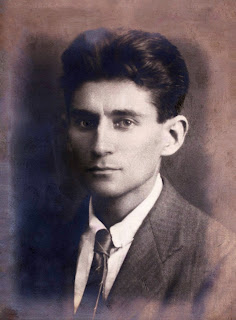Franz Kafka (1883-1924) was a famous writer best known for his analysis of emotion and surrealism. Wikipedia says,
"His work, which fuses elements of realism and the fantastic. It typically features isolated protagonists faced by bizarre or surrealistic predicaments and incomprehensible social-bureaucratic powers. and has been interpreted as exploring themes of alienation, existential anxiety, guilt, and absurdity." (Wikipedia: Franz Kafka, 8.20.21 UTC 19:29)Writer Marthe Robert said,
"The only way Kafka could envisage of creating his in every respect impossible writing possible was to demarcate the area of impossibility by making a language without a particular color, without a local tone, without qualities, as it were." (As Lonely as Kafka, 1953)The rest of this post is some quotes from Kafka.
Emotion
"I think we ought to read only the kind of books that wound and stab us. If the book we are reading doesn't wake us up with a blow on the head, what are we reading it for? ... we need the books that affect us like a disaster, that grieve us deeply, like the death of someone we loved more than ourselves, like being banished into forests far from everyone, like a suicide. A book must be the axe for the frozen sea inside us." (Letter to Oskar Pollak, January 1904)
"We are as forlorn as children lost in the woods. When you stand in front of me and look at me, what do you know of the griefs that are in me and what do I know of yours. And if I were to cast myself down before you and weep and tell you, what more would you know about me than you know about Hell when someone tells you it is hot and dreadful? For that reason alone we human beings ought to stand before one another as reverently, as reflectively, as lovingly, as we would before the entrance to Hell." (Letter to Oskar Pollak, November 1903)
Epistemology
"The right understanding of any matter and a misunderstanding of the same matter do not wholly exclude each other." (The Trial, 1920)
"Truth is indivisible, hence it cannot recognize itself; anyone who wants to recognize it has to be a lie." (The Zürau Aphorisms, posthumous)
"The whole visible world is perhaps nothing more than the rationalization of a man who wants to find peace for a moment. An attempt to falsify the actuality of knowledge, to regard knowledge as a goal still to be reached. " (Parables and Paradoxes, posthumous)
